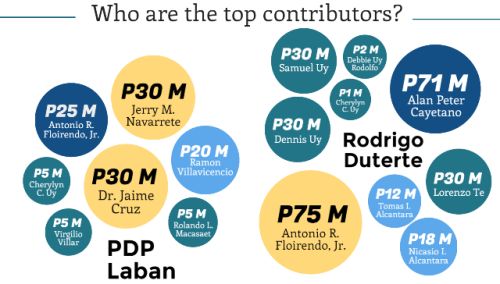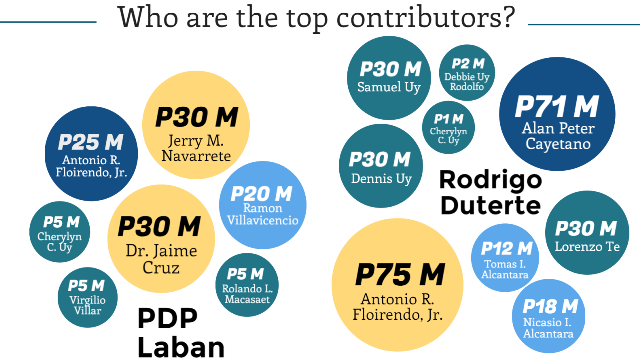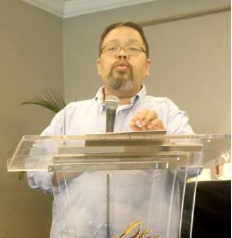What is a contribution?
“Contribution” includes a gift, donation, subscription, loan, advance or deposit of money or anything of value, or a contract, promise or agreement to contribute, whether or not legally enforceable, made for the purpose of influencing the results of the elections but shall not include services rendered without compensation by individuals volunteering a portion or all of their time in behalf of a candidate or political party. It also includes the use of facilities voluntarily donated by other persons, the money value of which can be assessed based on the rates prevailing in the area.
What is an expenditure?
An “expenditure” includes the payment or delivery of money of anything of value, or a contract, promise or agreement to make an expenditure, for the purpose of influencing the results of the election. It also includes the use of facilities personally owned by the candidate, the money value of the use of which can be assessed based on the rates prevailing in the area.
What contributions are prohibited?
No contribution for purposes of partisan political activity shall be made directly or indirectly by:
- Public or private financial institutions, but those legally in the business lending money are not prevented from making a loan to a candidate or political party. The loan has to be made to according laws and regulations and in the ordinary course of business
- Natural and juridical persons operating a public utility or in possession of or exploiting any natural resources of the nation
- Natural and juridical persons who hold contracts or sub-contracts to supply the government or any of its divisions, subdivisions or instrumentalities, with goods or services or to perform construction or other works
- Natural and juridical persons who have been granted franchises, incentives, exemptions, allocations or similar privileges or concessions by the government or any of its divisions, subdivisions or instrumentalities, including government-owned or controlled corporations
- Natural and juridical persons who, within one year prior to the date of the election, have been granted loans or other accommodations in excess of P100,000 by the government or any of its divisions, subdivisions or instrumentalities including government-owned or controlled corporations
- Educational institutions which have received grants of public funds amounting to no less than P100,000
- Officials or employees in the Civil Service, or members of the Armed Forces of the Philippines
- Foreigners and foreign corporations.
Can candidates solicit or receive contributions from foreign sources?
No. It is unlawful for any person, including a political party or public or private entity to solicit or receive, directly or indirectly, any aid or contribution of whatever form or nature from any foreign national, government or entity for the purposes of influencing the results of the election.
What is prohibited raising of funds?
It is unlawful for any person to hold dances, lotteries, cockfights, games, boxing bouts, bingo, beauty contests, entertainments, or cinematographic, theatrical or other performances for the purpose of raising funds for an election campaign or for the support of any candidate from the commencement of the election period up to and including election day
It is also unlawful for any person or organization, whether civic or religious, directly or indirectly, to solicit and/or accept from any candidate for public office, or from his campaign manager, agent or representative, or any person acting in their behalf, any gift, food, transportation, contribution or donation in cash or in kind from the commencement of the election period up to and including election day. However, normal and customary religious stipends, tithes, or collections on Sundays and/or other designated collection days, are excluded from this prohibition.
Can a candidate conceal the identity of the donor?
No person is allowed to make any contribution in any name except his own nor shall any candidate or treasurer of a political party receive a contribution or enter or record the same in any name other than that of the person by whom it was actually made.
What expenditures are allowed by law?
- Travelling expenses of the candidates and campaign personnel in the course of the campaign and for personal expenses incident thereto
- Compensation of campaigners, clerks, stenographers, messengers, and other persons actually employed in the campaign
- Telegraph and telephone tolls, postage, freight and express delivery charges
- Stationery, printing and distribution of printed matters relative to candidacy
- Employment of watchers at the polls
- Rent, maintenance and furnishing of campaign headquarters, office or place of meetings
- Political meetings and rallies and the use of sound systems, lights and decorations during said meetings and rallies
- Newspaper, radio, television and other public advertisements
- Employment of counsel, the cost of which shall not be taken into account in determining the amount of expenses which a candidate or political party may have incurred under Sections 100 and 101 of the Omnibus Election Code
- Copying and classifying list of voters, investigating and challenging the right to vote of persons registered in the lists the costs of which shall not be taken into account in determining the amount of expenses which a candidate or political party may have incurred under Sections 100 and 101
- Printing sample ballots in such color, size and maximum number as may be authorized by the Commission and the cost of such printing shall not be taken into account in determining the amount of expenses which a candidate or political party may have incurred under Sections 100 and 101
Who is authorized to incur election expenditures?
The candidate, treasurer of a political party or any person authorized by such candidate or treasurer. The authority to incur expenditures should be in writing, copy of which shall be furnished the Comelec signed by the candidate or the treasurer of the party and showing the expenditures so authorized, and stating the full name and exact address of the person so designated.
What are prohibited donations by candidates, treasurers of parties or their agents?
No candidate, his or her spouse or any relative within the second civil degree of consanguinity or affinity, or his campaign manager, agent or representative shall during the campaign period, on the day before and on the day of the election, directly or indirectly, make any donation, contribution or gift in cash or in kind, or undertake or contribute to the construction or repair of roads, bridges, school buses, puericulture centers, medical clinics and hospitals, churches or chapels cement pavements, or any structure for public use or for the use of any religious or civic organization. Normal and customary religious dues or contributions, such as religious stipends, tithes or collections on Sundays or other designated collection days, as well as periodic payments for legitimate scholarships established and school contributions habitually made before the prohibited period, are excluded from the prohibition.
Source: Omnibus Election Code


